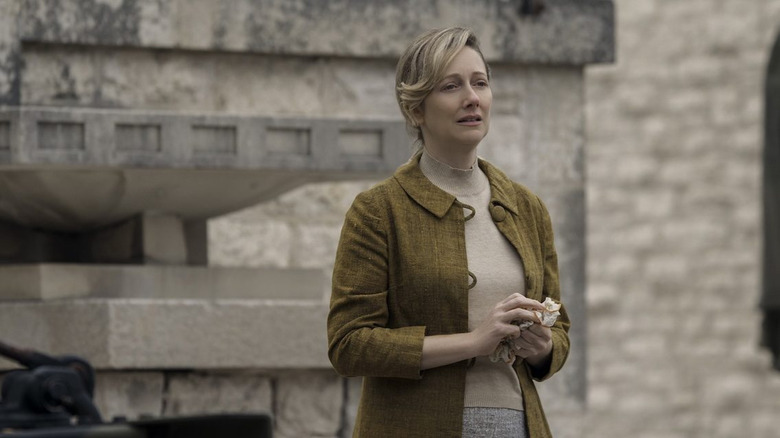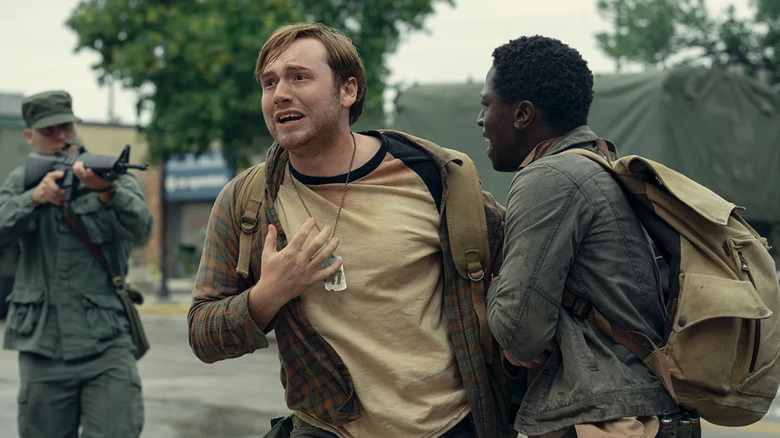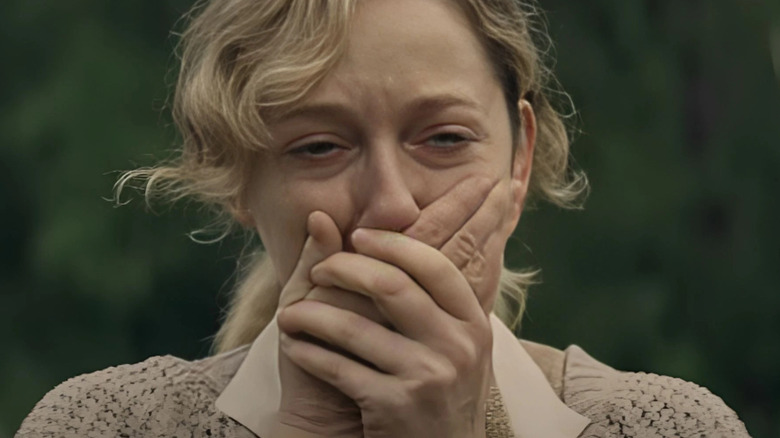A Great, Underrated Actor Makes Every Second Of Her Small Role In The Long Walk Count
Spoilers for "The Long Walk" follow.
Everyone knows who Judy Greer is even if they don't know her by name. Since the late 1990s, Greer has built up an impressive resume, frequently playing supporting characters in rom-coms like "What Women Want," "13 Going on 30, "27 Dresses," and "Love & Other Drugs." She's also appeared on TV shows like "Arrested Development," "The Big Bang Theory," and "It's Always Sunny in Philadelphia," provided voice work to the animated series "Archer," and had roles in Spike Jonze's "Adaptation," David Gordon Green's "Halloween" reboot series, and M. Night Shyamalan's underrated "The Village." You know her when you see her.
The one distinct thread that connects Greer's eclectic career is that she's almost always a supporting player, never the lead. As she writes in her autobiography "I Don't Know What You Know Me From: My Life as a Co-Star," "You've heard the phrase 'There are no small roles, just small actors'? Well, I kind of disagree. There are small roles, but when you get a lot of them in a row, you can become a pretty successful actress, and that's what I've done."
While Greer's many roles may be small, they're almost always memorable simply because she's so damn good at what she does. She has a certain spark that you can't help but notice, and she often ends up outshining the main character she's acting against — we want to see more of her. Greer once again has a small part to play, this time in the harrowing new Stephen King adaptation "The Long Walk." All told, I'd guess she probably has about 10 minutes of screentime, give or take. And yet, she makes every second she appears on screen count, delivering an absolutely heartbreaking performance that will once again remind you that Judy Greer is one of the best of the best.
The Long Walk is a brutal movie, and its most heartbreaking scene is delivered by Judy Greer
"The Long Walk" is set in a dystopian alternate America where 50 boys participate in a life or death contest. They must walk at 3 mph along a long stretch of road, never stopping, never slowing down. If they slow or stop, they get a warning. If they get three warnings, they are shot to death. In the end, only one of them can win, and the winner is awarded massive riches and a single wish for seemingly anything they want. We learn that you don't have to sign up to join the Long Walk, and there's even a specific date to back out if you do sign up. But every boy in the country inevitably signs up at one point or another. Including Ray Garraty, played by Cooper Hoffman.
We meet Ray at the beginning of the film where he's being dropped off at the starting point of the Long Walk. Dropping him off is his mother, Ginnie, played by Judy Greer. She's understandably nervous and anxious, but Ray tries to assure her he'll be fine. "It's only a couple of days," he tells her, deliberately ignoring the fact that he could very well be killed during those couple of days. Ginnie begs Ray to back out; to stay in the car and not go through with this, but of course, Ray does go through with it, and Ginnie drives away, weeping.
Greer appears two more times in the film: once during a flashback where we see Ray's defiant father executed by The Major (Mark Hamill), a sadistic figure who seems to be a kind of dictator ruling over the country, and then again when the Long Walkers pass through Ray's hometown. It's this moment that will likely break you.
At this point in the film, Ray has gone through absolute hell, watching as many of the friends he made during the walk have been violently executed. He's lost his shoes, he's exhausted, and he's realizing he's made a mistake. Then he spots his mother standing on the side of the road. He tips her a small wave and keeps walking — and then turns back and rushes to her. The rules state that anyone who steps off the road is immediately shot. Ginnie knows this, so pandemonium quickly ensues. Screaming and pleading, Ginnie backs away, begging Ray to not come near her, while Ray, who is being pulled back by his friend Pete (David Jonsson), says he only wants a hug and then tells his mother he's sorry for entering the Long Walk. All the characters are shouting at once, and a nearby soldier raises his gun, ready to shoot Ray dead. Eventually, Ray is pulled away, leaving Ginnie weeping at the side of the road. Neither of them knows it, but they will never see each other again.
Judy Greer really is one of the best of the best
Greer's performance in this particular scene is so raw, so panicked, so full of agony and horror, that it felt like a punch to the gut as I watched it. "The Long Walk" is a brutal movie — one of the most brutal mainstream movies in recent memory, in fact. It doesn't flinch away from graphic violence, and the violence is unrelenting. And yet, none of that violence impacted me as much as Greer's panicked screams as she staggers backwards, begging and pleading with her son to not get any closer to her — not because she doesn't want to see him, but because she knows that if he steps off that road he'll be killed right in front of her eyes.
Judy Greer tends to gravitate towards comedies. Even her work in David Gordon Green's "Halloween" films has a bit of a comedic bent to it (until Michael Myers stabs her to death in "Halloween Kills," that is). But there's nothing funny about what she's doing in "The Long Walk." It's a wrenching, deadly serious performance that aches with the fear of what might happen next.
"The Long Walk" is loaded with wall-to-wall great performances. All of the boys on the walk make an impression — Cooper Hoffman's Ray makes for a wonderful, likeable lead as we enter this world and David Jonsson, who was so good in "Alien: Romulus," is even better here, delivering the type of performance that people refer to as "star-making." Greer has one of the smallest parts to play in the film, and yet it still ends up standing out. Because she's just that good.
"The Long Walk" is now in theaters.


